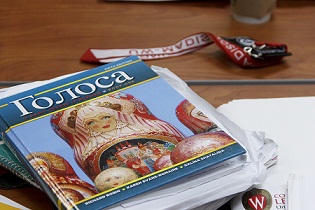Most of the students in the College of Letters & Science may be away for the summer, but that doesn’t mean the action has stopped on campus. Our faculty and staff are still living out the Wisconsin Idea, both in Madison and all over the world. This is a story in our Summer Snapshots series.
These students still have one more year of high school.
But for six weeks this summer, 12 students from inner-city Chicago are getting a preview of what it’s like to be University of Wisconsin-Madison students.
They’re the first participants in a new pre-college enrichment program in the College of Letters & Science’s Department of Slavic Languages and Literature called the Pushkin Summer Institute.
The students all attend Pritzker College Prep, a charter school in Chicago. Pritzker’s student population is predominantly Hispanic and the majority of its students will be first-generation college attendees.
Pritzker is an ideal fit for the Pushkin program, which is designed to give high school students from traditionally underrepresented demographic groups access to a high-level language and cultural education. The program’s curriculum combines intensive study of the Russian language with a focus on famed Russian poet Alexander Pushkin while building critical thinking and writing skills along the way.
The 12 students stay in dorm rooms at UW-Madison, attend class every weekday and write weekly papers. And they’re tasked with that all-important college lesson – managing their own schedules, albeit with some assistance from two Russian-speaking residential counselors.
“They’re getting a taste of college life,” said Benjamin Jens, the program’s onsite director.
Slavic Languages and Literature Professor David Bethea, one of the world’s foremost scholars on Pushkin, is the architect of the Institute.
He crafted a curriculum centered on Pushkin, Russia’s equivalent of Shakespeare. Bethea sees Pushkin’s life story as relevant, even to 16- and 17-year-old kids. Pushkin’s great grandfather was African and the poet had decidedly non-Russian features. He grew up in an aristocratic family that had fallen on hard times and tangled with the government and church throughout his life.
“There was this racial element that was an issue. And making mistakes and trying to rebound from those mistakes and learn from those mistakes, that’s kind of central to his story,” Bethea said. “… So I’m trying to use some of the lessons from his life as topics for discussion of character.”
But Bethea said it’s difficult to appreciate Pushkin’s works unless you’re reading them in Russian, and the Institute aims to dramatically improve students’ command of the language through intensive study. Graduate students Anna Borovskaya and Anna Nesterchouk, both native Russian speakers, teach daily language classes.
“This has been a challenge because we’ve been practicing and learning grammar every single day,” said student Gladys Ovalle, who, along with the rest of her classmates, began taking Russian classes every other day last year at Pritzker. “It’s been a challenge but we’ve learned a lot.”
Ovalle said she’d like to continue to pursue Russian, which is another goal of the Pushkin program. Students who participate in the program after their final two years of high school will be well placed for admission into UW-Madison’s Russian Flagship Program, which enables students to reach a professional command of the language that will allow them to land federal or international jobs.
But the Institute isn’t limited to teaching Russian skills. Bethea meets with the students on a weekly basis to review their papers and improve their writing. The program has also partnered with the UW-Madison Writing Center for workshops on literary analysis and writing statements of purpose for college applications. Jens has also scheduled plenty of field trips around the city to show off the campus and the surrounding community.
Next year, the Institute will add a second high school: Cicely Tyson School of Performing and Fine Arts of East Orange, New Jersey. Plans for partnering with a Wisconsin high school are also in the works.

